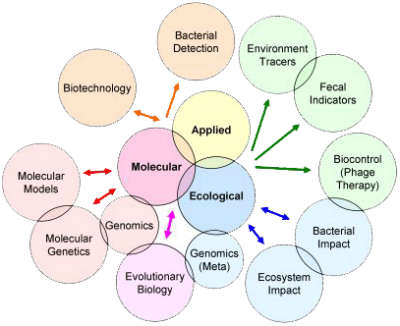Stephen Abedon
Professor of Microbiology
299 Conard Hall
1760 University Dr
Mansfield, OH 44906
Areas of Expertise
- Bacteriophage Ecology
- Phage Therapy Pharmacology
Education
- Ph.D. University of Arizona, 1990
- Postdoc, University of Pennsylvania, 1993-1995

Research Interests
My primary interests are in microbial evolutionary ecology and the pharmacodynamics of self-replicating drugs. In both of these areas my concentration is on bacteriophages (phages), the viruses of bacteria. Evolutionary ecology is the study of adaptation, particularly in terms of answering why questions, such as, why do organisms exhibit this behavior rather than another. A periodic emphasis of mine has been on the why of phage infection duration, called latent period. With longer duration phages produce more progeny, per individual infection, whereas with shorter duration they produce those progeny faster, at least on a per bacterial infection basis.
More recently I have been studying the ecology and evolutionary ecology of phage interaction with bacteria that are present in a more solid rather than planktonic phase, especially as seen on petri dishes or in biofilms. I use the information gleaned in order to better understand the ecology of phages in general, an important undertaking given that they are the most numerous organisms found on Earth. Since phages can also be used as antibacterial agents, so-called phage therapy, and there is extensive overlap between the idea of phages as ecological agents and phages as pharmaceutical agents, lately I have been applying my understanding of phage ecology to better understand phage therapy.
Though I have done experimental work, my primary emphasis, of late, has been more theoretical and synthetic. My goals are to understand and, where necessary, describe basic principles of phage evolutionary ecology and ecology. This I do by gathering up information found in the literature, looking for connections (synthesis of ideas), and developing both mathematical and descriptive models of how things at least should work.
Stephen Abedon's Curriculum Vitae [pdf]
Relevant Publications
Chan BK & Abedon ST (2015). Bacteriophages and Their Enzymes in Biocontrol. Current Pharmaceutical Design 21 (1):85-99.
Abedon ST (2011). Bacteriophages and Biofilms: Ecology, Phage Therapy, Plaques. Nova Science Publishers
Abedon ST & Thomas-Abedon C. (2010). Phage Therapy Pharmacology. Curr Pharm Biotechnol. 11, 28-47.
Hyman P & Abedon ST (2010). Bacteriophage Host Range and Bacterial Resistance. Adv Appl Microbiol. 70, 217-48.
Abedon ST (2009). Phage Evolution and Ecology. Adv Appl Microbiol. 67, 1-45.
Abedon ST (2009). Kinetics of Phage-Mediated Biocontrol of Bacteria. Foodborne Pathogens and Disease 6, 807-15.
Abedon ST (editor) (2008). Bacteriophage Ecology: Population Growth, Evolution, and Impact of Bacterial Viruses. Cambridge University Press.
Abedon ST & LeJeune JT (2005). Why Bacteriophage Encode Toxins and other Virulence Factors. Evol Bioinformatics 1, 97-110.
Abedon ST, Hyman P & Thomas C. (2003). Experimental Examination of Latent-Period Evolution as a Response to Bacterial Availability. Appl Environ Microbiol. 69, 7499-506. (recommended Faculty of 1000 Biology)
Abedon ST, Herschler TD & Stopar D. (2001). Bacteriophage Latent-Period Evolution as a Response to Resource Availability. Appl. Environ. Microbiol. 69, 4233-41. (featured in Nov., 2001, Vol. 67, Journal Highlights section of ASM News)
Abedon ST (2000). The Murky Origin of Snow White and Her T-even Dwarfs. Genetics. 155, 481-6.
Abedon, S. T. (2019). Look Who’s Talking: T-even Phage Lysis Inhibition, the Granddaddy of Virus-Virus Intercellular Communication Research. Viruses 11(10):951. ncbi.nlm.nih.gov/pubmed/31623057
Abedon, S. T. (2019). Use of Phage Therapy to Treat Long-Standing, Persistent, or Chronic Bacterial Infections. Advanced Drug Delivery Reviews 145:18-39. ncbi.nlm.nih.gov/pubmed/31708017
Abedon, S. T. (2019). Phage-Antibiotic Combination Treatments: Antagonistic Impacts of Antibiotics on the Pharmacodynamics of Phage Therapy? Antibiotics 8(4):182.
Dąbrowska, K., Abedon, S. T. (2019). Pharmacologically Aware Phage Therapy: Pharmacodynamic and Pharmacokinetic Obstacles to Phage Antibacterial Action in Bodies. Microbiology and Molecular Biology Reviews 83(4):e00012-19.
Abedon, S. T. (2018). Phage Therapy: Various Perspectives on How to Improve the Art. Methods in Molecular Biology 1734:113-127.
Hyman, P., Abedon, S. T. (2018). Viruses of Microorganisms, Caister Academic Press, Norwich, UK. caister.com/vom
Abedon, S. T. (2017). Phage “Delay” Towards Enhancing Bacterial Escape from Biofilms: A More Comprehensive Way of Viewing Resistance to Bacteriophages. AIMS Microbiology 3(2):186-226.
Abedon, S. T., Thomas-Abedon, C., Thomas, A., Mazure, H. (2011). Bacteriophage Prehistory: Is or is not Hankin, 1896, a Phage Reference? Bacteriophage 1(3): 174-178. ncbi.nlm.nih.gov/pubmed/22164351
Curtright, A. J., Abedon, S. T. (2011). Phage Therapy: Emergent Property Pharmacology. Journal of Bioanalysis & Biomedicine. S6:002.
Hyman, P., Abedon, S. T. (2010). Bacteriophage Host Range and Bacterial Resistance. Advances in Applied Microbiology 70:217-248. ncbi.nlm.nih.gov/pubmed/20359459
Abedon, S. T. (2008). Bacteriophage Ecology: Population Growth, Evolution, and Impact of Bacterial Viruses. Cambridge University Press.
Abedon, S. T. (2000). The Murky Origin of Snow White and Her T-even Dwarfs. Genetics 155:481-486.
Google Scholar
PubMed
